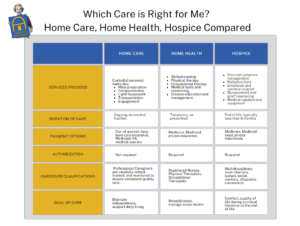What Is the Difference Between Home Care, Home Health, and Hospice?
This is perhaps the most frequently asked question we encounter—and understandably so. As we age, or as our parents and loved ones grow older, there invariably comes a time when the need for some assistance becomes apparent. Often, this realization strikes when seemingly simple yet pivotal moments occur—like deciding it’s time for someone to stop driving.
Sometimes, the need to evaluate added care comes during a crisis, like learning of a cancer diagnosis, after a bad accident, or other medical emergency. These moments can prompt a cascade of questions about what comes next. Whether it’s needing help with regular errands such as grocery shopping or more comprehensive care, recognizing this need is the first step.
If you’re reading this, you’re likely exploring which care options will best suit your unique situation. There are three options for care that can be provided at home: Home Care, Home Health, and Hospice. Each serves a distinct purpose and caters to different needs, from personal care to medical care and end-of-life support. It can be incredibly confusing to determine which is best for your situation. Here is an overview of all three, and a deeper dive into how Home Care may be utilized.

Hospice
Hospice is often used interchangeably with Palliative Care, though they are different in that Palliative Care can be used for a serious illness, regardless of prognosis. Both may be used to assist with life-limiting illnesses, but Hospice care can only be used with a prognosis of 6 months or less. However, palliative Care can be incorporated into Hospice Care to enhance quality of life and help patients manage symptoms.
Because Hospice can only be used with a prognosis of 6 months or less, Hospice has earned an incorrect reputation as a “death sentence,” though this is not accurate. Many patients begin in hospice, but are able to graduate out to alternative care with proper symptom management and nutrition.
For those who are terminal, the focus shifts from curative treatment to comfort care, aiming to relieve symptoms and reduce discomfort. This type of care involves a multidisciplinary team approach, including doctors, nurses, social workers, and spiritual advisors, who collectively help manage the physical, emotional, and spiritual needs of the patient and their family. Hospice care can be provided at home, in a hospice center, or in a hospital setting, ensuring that the individual spends their remaining time in dignity and with as little pain as possible.
Both Hospice and Palliative Care are generally covered by Medicare, Medicaid and most private insurance plans, but coverage can vary for specific services.
Home Health
Home Health is a step up from Home Care in terms of medical involvement and is typically prescribed by a doctor following a hospitalization or significant health diagnosis that requires professional medical care. This service is provided by medical professionals such as nurses, physical therapists, and occupational therapists. Probably the most important distinction between Home Health and Home Care is the patient must be homebound in order to qualify. So if they are receiving Home Health services and for example, their daughter is graduating from high school, they will miss that important event in their child’s life, because they must be homebound to qualify for Home Health Services.
Home Health can be confused at times with Palliative Care, as both approaches provide medical and supportive services to patients; however, with Home Health, the focus is on improving functional abilities.
Home Health provides medical and therapeutic care to help patients recover from illness or injury, manage chronic conditions, and maintain their health and independence. Home Health accomplishes this through a myriad of services, such as: wound care, medication management, physical rehabilitation, Physical Therapy, Occupational Therapy, Speech Therapy, patient and family education, and other medical services. Home Health is designed for individuals who have specific health conditions that need regular medical attention but can be managed at home. These services are provided in the home, typically 2-8 hours weekly.
Home Health is generally covered by Medicare, Medicaid and some private insurance plans, but coverage can vary for specific services.
Home Care
Home Care services focus on assistance with daily living activities to help individuals maintain their independence in the comfort of their own homes. This type of care is provided by Professional Caregivers and is considered custodial, which means Professional Caregivers help with tasks such as bathing, dressing, cooking, and light housekeeping. Professional Caregivers provide companionship, which is essential for preventing loneliness and promoting mental health. These services are ideal for seniors who are mostly independent but need some assistance with their daily routine.
A big advantage of choosing Home Care is that home care services do not require referrals from healthcare professionals. This means the client and their family determine the number of hours and duration of visits, and only the client or their family can stop the services. With both Hospice and Home Health, you are placed on a schedule during which providers check in to monitor progress or provide medical or therapeutic care. Though both often have 24/7 on-call services, there is no continuous care option. Home Care gives you or your loved one control to determine how much care is needed and in what capacity.
Both hospice and home health require a physician to prescribe the services, which means Medicare, Medicaid, and VA can terminate services with little to no notice if the client is not progressing as expected. The number of hours and duration of these home-based services are also limited because they need to be passed through and approved by insurance.
Another really important distinction is that Home Health and Hospice providers are not in the home 24/7. Though many may be called on 24/7, there is not an option for live-in or 24 hour care.
At Adultcare Assistance Homecare, we are dedicated to providing Home Care exclusively to the Tucson, Phoenix, and Sun City communities. Our services cater to a diverse range of needs, from clients who prefer occasional help to those who require 24-hour live-in care.
If you or your loved one needs 24/7 care, neither Home Health or Hospice will be able to accommodate those needs, but Home Care can as we are not restricted by an overseeing physician or stringent insurance regulations.
Because you as a client or family caregiver selecting care for your loved one are in control, Home Care is not typically covered by most private insurances. Payment options for Home Care include private pay, Long-Term Care Insurance, Medicaid, VA, and Medical Waivers.
While we’ve begun to clarify the distinctions between your care options, you may still be wondering exactly what kinds of assistance are appropriate for Home Care. What exactly does “custodial” or “personal” tasks mean, and how would/could that help me or my loved one?
What Types of Tasks Can a Home Care Professional Do?
Professional Caregivers are equipped to handle a wide range of daily activities that can significantly enhance the quality of life for their clients. Care can range from short-term to long-term, continuous care, which means it can evolve as a client’s needs change. Each client is unique, but typically Professional Caregivers assist with:
Personal Care: Activities such as bathing, dressing, grooming, and toileting are handled with respect and sensitivity, helping clients maintain their dignity as they navigate physical limitations.
Transportation: Professional Caregivers can also drive clients to appointments, social outings, or family events, helping them stay connected with their community and fulfilling social needs.
Mobility Assistance: They provide support with walking and transferring, ensuring safety around the home, which is crucial for preventing falls.
Specialized Care for Dementia or Alzheimer’s: For clients dealing with cognitive impairments, caregivers can implement strategies to manage symptoms, provide mental stimulation, and maintain a safe environment.
Engagement is the most important service a caregiver can provide. Engaging with a client helps them emotionally and mentally. Caregivers build a deep emotional connection with their clients, establishing trust so clients can openly and honestly communicate their needs and feelings.
What to Look for When Selecting a Caregiver
When considering home care for yourself or a loved one, the variety of needs and the breadth of tasks involved make it imperative to choose caregivers who are professional, reputable, and genuinely compassionate. The caregiver will play a crucial role in the care recipient’s daily life, and the potential for abuse or neglect makes the selection process critical. It’s important to ensure that caregivers are thoroughly vetted to prevent any risk of exploitation or harm.
At Adultcare Assistance Homecare, we prioritize the safety and well-being of our clients above all else. Our rigorous vetting process includes comprehensive background checks, detailed interviews, and professional training. We look for caregivers who have the right skills and embody empathy and integrity. By maintaining high standards, we ensure that our caregivers are trustworthy and well-equipped to provide the highest level of care.
Additionally, we encourage open communication between our clients and our management team, creating a transparent environment where concerns can be addressed promptly and effectively. This approach enhances safety and builds a relationship of trust and respect, which is fundamental to the personal nature of home care services.
By selecting Adultcare Assistance Homecare, families in the Tucson, Phoenix, and Sun City communities can rest assured that their loved ones are in safe, caring hands. We understand the importance of providing a service that respects the dignity and individuality of each person we serve, ensuring that their day-to-day needs are met with kindness and professionalism.





